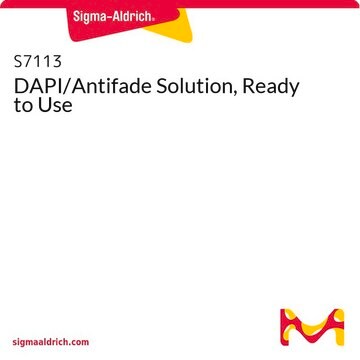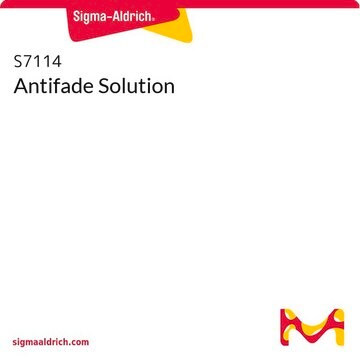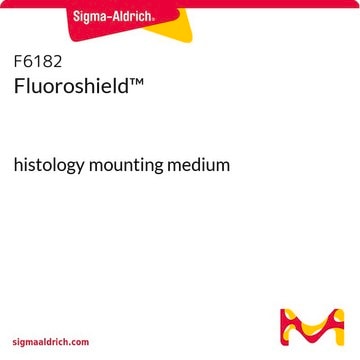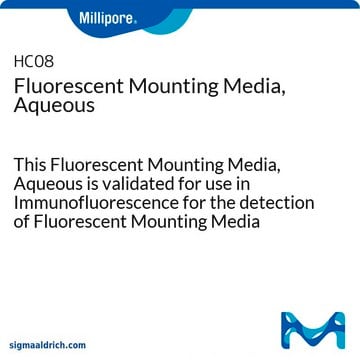MBD0015
4′,6-diamidino-2-fenilindolo
For Nuclear counterstain in immunoflourecence microscopy, High Content Screening (HCS), Chromosome staining and flow cytometry (FACS)., 1 mg/mL
Sinonimo/i:
2-(4-amidinofenil)-6-indolocarbammidina, DAPI
About This Item
Prodotti consigliati
Livello qualitativo
Forma fisica
liquid
Condizioni di stoccaggio
protect from light
Concentrazione
1 mg/mL
tecniche
transfection: suitable
Solubilità
water: soluble
Fluorescenza
λex 340 nm; λem 488 nm (nur DAPI)
λex 364 nm; λem 454 nm (DAPI-DNA-Komplex)
Compatibilità
suitable for nucleic acid staining
Condizioni di spedizione
dry ice
Temperatura di conservazione
−20°C
Stringa SMILE
Cl.Cl.NC(=N)c1ccc(cc1)-c2cc3ccc(cc3[nH]2)C(N)=N
InChI
1S/C16H15N5.2ClH/c17-15(18)10-3-1-9(2-4-10)13-7-11-5-6-12(16(19)20)8-14(11)21-13;;/h1-8,21H,(H3,17,18)(H3,19,20);2*1H
FPNZBYLXNYPRLR-UHFFFAOYSA-N
Cerchi prodotti simili? Visita Guida al confronto tra prodotti
Categorie correlate
Descrizione generale
Applicazioni
DAPI is several times more sensitive than ethidium bromide for staining DNA in agarose gels. It may be used for photofootprinting of DNA, to detect annealed probes in blotting applications by specifically visualizing the double-stranded complex, and to study the changes in DNA and analyze DNA content during apoptosis using flow cytometry. DAPI staining has also been shown to be a sensitive and specific detection method for mycoplasma.
For Nuclear counterstain in immunoflourecence microscopy, High Content Screening (HCS), Chromosome staining and flow cytometry (FACS).
Azioni biochim/fisiol
Caratteristiche e vantaggi
- Ready-to-use liquid, cell permeable dye.
- Can be used with live cells and fixed cells.
- Effective for fixed-cell staining and quantitation of DNA content.
- Optimal Counterstain when using fluorescent antibodies during fluorescence microscopy or high-content screening (HCS) applications.
Stato fisico
Avvertenze
Warning
Indicazioni di pericolo
Consigli di prudenza
Classi di pericolo
Skin Sens. 1
Codice della classe di stoccaggio
12 - Non Combustible Liquids
Classe di pericolosità dell'acqua (WGK)
WGK 1
Punto d’infiammabilità (°F)
Not applicable
Punto d’infiammabilità (°C)
Not applicable
Certificati d'analisi (COA)
Cerca il Certificati d'analisi (COA) digitando il numero di lotto/batch corrispondente. I numeri di lotto o di batch sono stampati sull'etichetta dei prodotti dopo la parola ‘Lotto’ o ‘Batch’.
Possiedi già questo prodotto?
I documenti relativi ai prodotti acquistati recentemente sono disponibili nell’Archivio dei documenti.
I clienti hanno visto anche
Il team dei nostri ricercatori vanta grande esperienza in tutte le aree della ricerca quali Life Science, scienza dei materiali, sintesi chimica, cromatografia, discipline analitiche, ecc..
Contatta l'Assistenza Tecnica.












